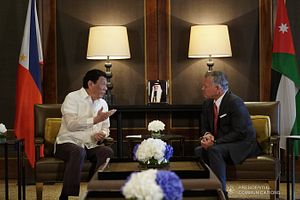This week, the Philippine defense chief offered an update on the status of a new helicopter deal between Jordan and the Philippines that was officially announced last year. The update once again put the focus on a significant agreement for the defense relationship between the two sides that has seen some development under the administration of Philippine President Rodrigo Duterte.
As I have observed previously in these pages, while the Philippines and Jordan have had a diplomatic relationship since 1976, ties have remained largely underdeveloped, including on the defense side. But Duterte’s visit to Jordan last year, which followed one to Israel, put the potential for security collaboration in the spotlight, with both sides placing attention on the shared threat of terrorism and a new memorandum of understanding on defense cooperation signed between the Philippines Department of National Defense (DND) and the Jordan Armed Forces-Arab Army.
Among the developments that emerged during that visit on the defense side was the Jordanian government’s provision of two Bell AH-1 Cobra attack helicopters to the Philippines. While there had been suggestions of a deal for a while before that as well, during the visit, Special Assistant to the President Christopher “Bong” Go confirmed the deal and said that the helicopters are expected to be delivered around next July, following the training of Philippine pilots.
This week, the deal was in the headlines again with remarks given by Defense Secretary Delfin Lorenzana. When asked about the deal on Monday given the earlier timeline that had been unveiled, Lorenzana said it would take several more months for the helicopters to actually be delivered, even though some aspects of collaboration had already been taking shape.
Per the Philippines News Agency (PNA), when asked for an update on the deal, Lorenzana said that while Philippine pilots had already been going for training in Jordan, it may be “many more months” before the helicopters were actually brought to the Philippines. He also added that while a specific timeline was unclear, “we hope it will be before the year ends.”
While Lorenzana did not provide much further in the way of specifics, the timeline was much further out than had been suggested before. Still, his comments are not altogether surprising. As I emphasized when evaluating the deal after it was signed, the progress of the deal has long lagged behind the chatter about it. And with respect to the deal itself, while there had been a rough sense of when a delivery date would be expected, neither side had provided a specific timeline for intermediate steps. Given this, the status of the realization of the deal will continue to be important to monitor in the months that follow.

































